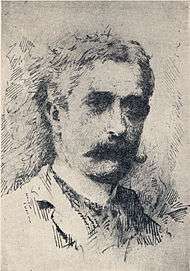Giovanni Verga
| Giovanni Verga | |
|---|---|
 | |
| Born |
Giovanni Carmelo Verga 2 September 1840 Catania, Sicily, Italy |
| Died |
27 January 1922 (aged 81) Catania, Sicily, Italy |
| Occupation | Writer |
| Nationality | Italian |
| Literary movement | Realism |
Giovanni Carmelo Verga (2 September 1840 – 27 January 1922) was an Italian realist (Verismo) writer, best known for his depictions of life in his native Sicily, and especially for the short story (and later play) Cavalleria Rusticana and the novel I Malavoglia (The House by the Medlar Tree).[1]
Life and career
The first son of Giovanni Battista Catalano Verga and Caterina Di Mauro, Verga was born into a prosperous family of Catania in Sicily. He began writing in his teens, producing the largely unpublished historical novel Amore e Patria (Love and Country); then, although nominally studying law at the University of Catania, he used money his father had given him to publish his I Carbonari della Montagna (The Carbonari of the Mountain) in 1861 and 1862. This was followed by Sulle lagune (On the Lagoons) in 1863.

Meanwhile, Verga had been serving in the Catania National Guard (1860–64), after which he travelled to Florence several times, settling there in 1869.
He moved to Milan in 1872, where he developed his new approach, characterized by the use of dialogue to develop character, which resulted in his most significant works. In 1880 his story collection Vita dei campi (Life in the Fields), including "Fantasticheria" ("Daydreaming"), "La Lupa" ("The She-wolf"), "Pentolaccia" ("The Plaything"), and Rosso Malpelo, most of which were about rural Sicily, came out. It also included "Cavalleria Rusticana" ("Rustic Chivalry"), which he adapted for the theatre and later formed the basis for several opera librettos including Mascagni's Cavalleria rusticana and Gastaldon's Mala Pasqua!. Verga's short story, "Malaria", was one of the first literary depictions of the disease malaria.
He then embarked on a projected series of five novels, but only completed two, I Malavoglia and Mastro-don Gesualdo (1889), the second of which was the last major work of his literary career. Both are widely recognized as masterpieces.
In 1894 Verga moved back to Catania, to the house in which he had lived as a child. In 1920 he was appointed Senator of the Kingdom (Senatore del Regno) for life (ad vitam). He died of a cerebral thrombosis in 1922.
The Teatro Verga in Catania is named after him. His house in via Sant'Anna is now a museum, the Casa-Museo Giovanni Verga.
He was an atheist.[2]
Bibliography

Novels
- Love and homeland (1856–1857)
- Carbonari of the mountain (1861–1862)
- On the lagoons (1862–1863)
- A sinner (1866)
- History of a Capinera (1871)
- Eva (1873)[3]
- Eros (1875)
- Royal tiger (1875)
- I Malavoglia (1881)
- Elena's husband (1882)
- Mastro-don Gesualdo (1889)
- From your to my (1905)
Short stories

- Nedda (1874)
Spring and other stories (1877) (Primavera e altri racconti)
- Spring (Primavera)
- The tail of the devil (La coda del diavolo)
- X (X)
- Certain subjects (Certi argomenti)
- The stories of the Trezza's castle (Le storie del castello di Trezza)
- Rosso Malpelo (1878)
The life of the fields (1880) (Vita dei campi)
- Rustic Chivalry (Cavalleria rusticana)
Little Novels of Sicily (1883) (Novelle rusticane) translated by D.H. Lawrence (1925)
- His Reverence (Il reverendo)
- So Much for the King (Cos'è il re)
- Don Licciu Papa (Don Licciu papa)
- The Mystery Play (Il mistero)
- Malaria (Malaria)
- The Orphans (Gli orfani)
- Property (La roba)
- Story of St. Joseph's Ass (Storia dell'asino di S. Giuseppe)
- Black Bread (Pane nero)
- The Gentry (I galantuomini)
- Liberty (Libertà)
- Across the Sea (Di là del mare)[4]
Notes
- ↑ Editors, The (1922-01-27). "Giovanni Verga | Italian author". Britannica.com. Retrieved 2016-10-30.
- ↑ Simona Cigliana, Roberto Fedi, Giovanni Verga, Istituto Poligrafico e Zecca dello Stato, 2002, p. 287.
- ↑ Digitami
- ↑ Verga, Giovanni. D.H. Lawrence, Translator. 2000. Little Novels of Sicily. Steerforth Press. Hanover, New Hampshire. 145 pp. ISBN 1-883642-54-X.
References
- Gesù Sebastiano L'Etna nel cinema. Un vulcano di celluloide, Giuseppe Maimone Editore, Catania, 2005
- Nunzio Zago, Racconto della letteratura siciliana, Giuseppe Maimone Editore, Catania 2000
- Scritti su Verga, di Luigi Pirandello e Vittorio Emanuele Orlando, prefazione di Giuseppe Giarrizzo, Giuseppe Maimone Editore, Catania, 1992
- Verga e il cinema. Con una sceneggiatura verghiana inedita di Cavalleria rusticana, testo di Gesualdo Bufalino a cura di Nino Genovese e Sebastiano Gesù, Giuseppe Maimone Editore, Catania, 1996
 Chisholm, Hugh, ed. (1911). "Verga, Giovanni". Encyclopædia Britannica. 27 (11th ed.). Cambridge University Press.
Chisholm, Hugh, ed. (1911). "Verga, Giovanni". Encyclopædia Britannica. 27 (11th ed.). Cambridge University Press.
External links
| Wikimedia Commons has media related to Giovanni Verga. |
- Works by Giovanni Verga at Project Gutenberg
- Works by or about Giovanni Verga at Internet Archive
- Works by Giovanni Verga at LibriVox (public domain audiobooks)

- (Italian) Giovanni Verga: all the works
- (Italian) I Malavoglia - chapter 1 on audio mp3 for free
- (Italian) Collected works of Giovanni Verga
- (Italian) All the novels of Giovanni Verga detailed by years
- Poor People are Like Oysters: The Life of Giovanni Verga
- Rosso Malpelo (full text) at The Short Story Project